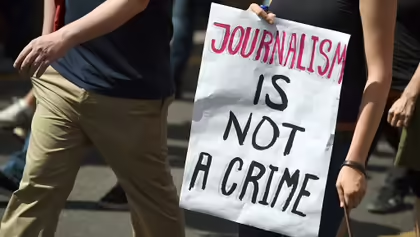In any democracy, a free press is a cornerstone of accountability and transparency, playing a pivotal role in informing the public and holding power to account. In Nigeria, recent events have put the spotlight on the country’s commitment to upholding press freedom.
The imprisonment of a journalist for over seven days has stirred widespread concern about the state of press freedom in Nigeria. This event, which quickly gained national and international attention, is a stark reminder of the challenges journalists face in the country. The situation raises questions about the legal and policy framework protecting journalists, as well as the broader implications for democracy and governance.
A free press is more than a journalistic luxury; it is a fundamental pillar of democratic governance. It ensures transparency by shedding light on government actions, corruption, and abuses of power. It facilitates informed discourse among citizens and policymakers, fostering a culture of openness and accountability.
When journalists are targeted, silenced, or threatened, it sends a chilling message to the entire media community. Such actions can lead to self-censorship, suppressing critical reporting and undermining public trust in both the media and government.
Journalists in Nigeria face multiple challenges, including legal and physical threats, censorship, and intimidation. Despite Nigeria’s constitutional guarantee of freedom of the press, enforcement remains inconsistent, leaving journalists vulnerable. Governmental and non-governmental actors may attempt to censor or intimidate journalists, affecting their ability to report freely.
To defend press freedom in Nigeria, several measures are essential:
Strengthening Legal Protections: Nigeria’s legal framework must robustly protect journalists and guarantee their ability to report without fear of retaliation. Currently, the legal protections for journalists are inadequate, often failing to provide the necessary security and freedom for media professionals to carry out their duties. Enhanced legal protections would not only provide a safer environment for journalists but also act as a deterrent against those who might seek to intimidate or harm them. For example, laws that impose severe penalties on those who harass or attack journalists would send a strong message that such actions are unacceptable. According to Amnesty International, Nigeria’s legal framework has not sufficiently protected journalists.
Promoting Media Independence: Media outlets must be able to operate independently of government influence or interference. When media organizations are free from governmental control, they can report on issues without bias or fear of retribution. This independence is crucial for uncovering corruption and holding officials accountable. Instances where Nigerian authorities have intervened in media operations undermine this independence and, by extension, the public’s trust in the media. Supporting media independence can be achieved through policies that prevent governmental ownership of media outlets and protect against undue political pressure. The Committee to Protect Journalists has reported instances where Nigerian authorities have intervened in the operations of media outlets.
International Support: International organizations and press freedom advocates can play a vital role in supporting Nigerian journalists and advocating for their protection. Global attention and pressure can compel Nigerian authorities to respect and uphold press freedom. The World Press Freedom Index by Reporters Without Borders highlights countries where press freedom is at risk, drawing international attention and resources to support local journalists. International bodies can also provide legal, financial, and moral support to journalists facing threats, helping to create a safer environment for press operations.
Raising Awareness: Public awareness campaigns can emphasize the importance of press freedom and its impact on society. When the public understands the critical role of a free press in democracy, there is greater societal support for protecting journalists. Organizations like PEN International engage in such campaigns, which can lead to increased public pressure on the government to uphold press freedoms. Educating the public on the dangers journalists face and the importance of their work can foster a more supportive environment for media professionals.
Holding Authorities Accountable: Authorities must be held accountable for any actions that threaten press freedom and journalists’ safety. Ensuring accountability involves prosecuting those who harass or harm journalists and implementing policies that protect press freedom. According to Human Rights Watch, there have been instances where authorities have been involved in harassment or threats against journalists. Accountability measures, such as independent investigations and judicial processes, can deter future violations and demonstrate a commitment to upholding press freedom.
Defending press freedom in Nigeria is crucial for the country’s democratic future. By ensuring that journalists can work without fear or intimidation, Nigeria can strengthen its commitment to transparency, accountability, and open discourse. It is up to policymakers, media organizations, and the public to stand together in defense of this fundamental human right.
By addressing these issues, Nigeria can ensure that its journalists are protected and empowered to continue their crucial work. The imprisonment of journalists and other acts of intimidation must be met with strong legal protections and a robust response from both the national and international community. The future of Nigeria’s democracy depends on the freedom and safety of its press.

